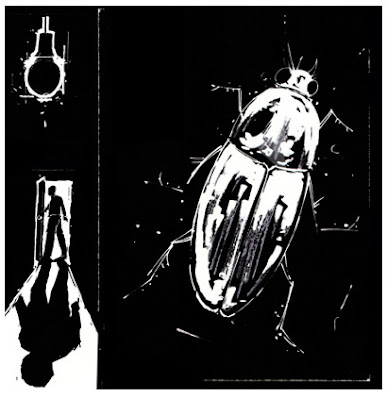Kafka identifies the role of characters and their persona, especially the gender role. The mother doesn't work, she doesn't do anything around the house except the cooking and the cleaning. She relies on her son, Gregor, for everything. Her role is very similar to the father's role too. Gregor's father doesn't fulfill the role as a leader, him and the mother both caused a lot of debt in which Gregor is paying for. The sister, Grete, has a very strong role. She cooked and cleaned for Gregor after his transformation into an insect, taking on the mother's role briefly. As time progresses Grete's demeanor changed and she no longer accepted Gregor's change. She also felt it was Gregor's job to provide for the family, and when he doesn't get up to go to work she becomes upset. After awhile Grete took on the job as a salesgirl. Grete played the violin and she wanted her brother, Gregor, to come to her recital but when he came... she becomes ungrateful. She doesn't claim him and even calls him a creature. Because of Gregor's transformation it allowed Grete to step up within the family and take on Gregor's role. She's even getting married!
Gender roles are visible in the modern world. Women are suppose to equal the beautiful house wife, as with men equaling the support beam. But in Franz Kafka's Metamorphosis, the characters aren't portraying the modernized role of women and men. The father is weak and doesn't support the family to any extent and he's irresponsible. The mother is your stereotypical house wife who cooks and cleans. But the sister, Grete, actually has a dominant role. She does what she has to do after her brother, Gregor, can't. Balanced gender roles promote growth; and that's what happened with Gregor and Grete.
Gregor was the provider. He's the definition of a true man. He portrays the dominant man role that his father lacks in. All before his metamorphosis which caused a nightmare. His biggest nightmare was when his family turned on him. Which led to his death. His sister, Grete, wanted to get rid of him and the family agreed.
In the end, Gregor was a good man. Although his physical changes made his lose his job, lose his family, and even worse...lose his life. Kafka had a poor relationship with his family as he went through tuberculosis, and because of that he wrote "Metamorphosis" in comparison to his life.
Work Cited
Sokel, Walter H. “Kafka’s Metamorphosis: “Rebellion and Punishments. The University of
Wisconsin Press. Web. 21 May. 2012
Bryans, Lauren. "Gender Equality in Franz Kafka's Metamorphosis." Voices.Yahoo. N.p., 13 10 2010. Web. 25 May 2012. <http://voices.yahoo.com/gender-equality-franz-kafkas-metamorphosis-6689656.html>.


I enjoyed reading your blog. You did a great Job on explaining each person role and what was right and what was wrong.
ReplyDeleteI agree with your essay. It describe the feminist in the fiction. Please high light the quote in the end of the sentence.
ReplyDeleteI don't know why you talk about Kafka's relationship in the last paragraph.
I agree with you that Grete's role changes a lot in the story. I think you did a good job finding examples of that within the story and being able to describe her changes. I like how you also compared the family from "The Metamorphosis" to modern day family roles. I think it made it easier to identify with.
ReplyDeleteI really enjoyed your blog. Especially how you described not only the transformation in Gregor's life but that in Grete's as well. You provided good examples of the gender roles in the story.
ReplyDeleteI do agree with you that a lot of times in literature the gender roles are very stereotypical. However, I do not understand some of the roles you have brought up. In he story the Samsa’s had servants that cooked, cleaned, and ran the family arens. Gregor’s mother did however later in the story did help with the cooking after the lodgers had moved in mainly out of wanting to please the renters. Also the lodgers are the reason for Grete’s recital. She had picked up her violin for the first time in months and the lodgers heard her in the kitchen and asked for her to come and entertain them. Then they became irritated by her meritocracy and Gregor heard the lodgers’ frustration and came to his sister so someone would appreciate her talent. But, I do agree with you opinions on the father and Grete.
ReplyDeleteI agree with you he was the breadwinner the the family but the father didn't care about anything, mostly the money. I also agree that Gregor's biggest nightmare was when his family turned against him.
ReplyDeleteCamus and Kafka, the deep writing
ReplyDeleteCamus and Kafka are not absurd. As literature is a way of describing real and mental life with metaphors, but they reveal the essential existence. What is essential in this literature is to show the loneliness and oppression, through the expression. Phrases and absurd disguise the narrative of symbols, but one recognizes the meaning, what the authors wanted to reveal: the human condition subjected by an ungrateful and inhuman society. These meanings presented in an unusual way is the art of difference, originality. Both authors showed us his personal tragedy, and opened new paths to literature. They are paradigms of deep writing that offers non-visible dimensions of everyday human tragedy.
See my Camus’s review: http://www.letraslibres.com/autores/antonio-ramos-z